Table of Contents
Heartburn is a common digestive disorder that affects millions of Filipinos every year. It is a burning sensation felt in the chest caused by acid regurgitation into the esophagus. While antacids are commonly used to relieve heartburn, lifestyle changes, and more effective treatments can be used when antacids just don’t cut it. This article will provide an overview of the various treatments for heartburn and the pros and cons associated with each one.
Causes of Heartburn
Heartburn can cause discomfort and even pain, and several different factors can cause it.
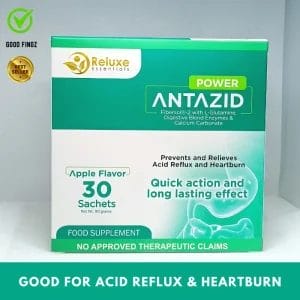
Food-Related Causes of Heartburn
Food-related causes are particularly prevalent and should not be overlooked when considering potential causes of heartburn. These food-related causes range from certain dietary habits to eating specific foods that can trigger the unpleasant symptoms associated with heartburn.
The most common food-related cause of heartburn is overeating, which places additional pressure on the stomach, allowing acid to pass into the esophagus. Eating too quickly or not chewing food properly can also lead to swallowing air, which contributes to increased pressure in the stomach and therefore increases the likelihood of developing heartburn.
Additionally, some Filipinos may find that consuming spicy foods upregulates their production of stomach acid, leading to an increase in symptoms such as burning sensations in the chest or throat area.

Medication and Supplements as Triggers for Heartburn
Medication and supplements are two of the most common triggers for heartburn, especially if taken on an empty stomach. Certain medications that relax the lower esophageal sphincter, such as nitrates and calcium channel blockers, can cause acid reflux and heartburn.
Additionally, pain relievers like ibuprofen, aspirin, or naproxen may contribute to symptoms since they irritate the gastrointestinal tract. Supplements containing iron may also be triggers for some Filipinos since they can increase gastric acid production in the stomach.
Filipinos who suffer from frequent heartburn should speak with their doctor about possible triggers related to medication and supplements before trying any treatments at home.
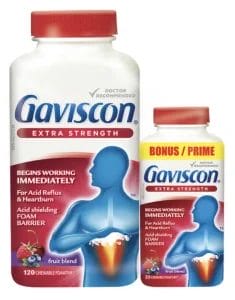
Stress and Anxiety as Contributors to Heartburn
Research has shown that when we experience high stress or anxiety levels, our bodies produce more stomach acid than usual, leading to heartburn.
The way in which stress or anxiety-induced heartburn works is that when an individual’s body experiences these emotions, it releases hormones like cortisol and epinephrine, which cause their muscles to tense up. This includes muscles in the esophagus, increasing pressure on the lower esophageal sphincter (LES). When this happens, it becomes harder for the LES to keep stomach acids down where they belong instead of regurgitating back into the throat, causing heartburn.
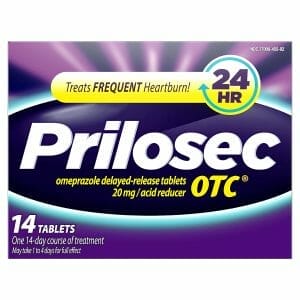
Smoking and Alcohol Consumption as Risk Factors for Heartburn
There are several causes of heartburn, with two among the most prominent being smoking and alcohol consumption. Smoking has been linked to increased stomach acid production and weakened lower esophageal sphincter muscles that allow stomach acid to escape into the esophagus.
Alcohol consumption also increases the risk of heartburn due to its acidic nature and its ability to relax the lower esophageal sphincter muscles. Furthermore, high levels of alcohol intake have been found to irritate and inflame the lining of the esophagus.
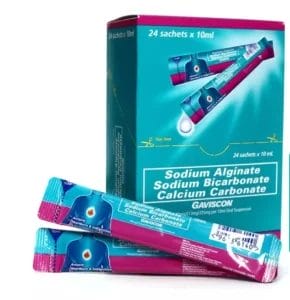
Hormonal Changes and Pregnancy-Related Heartburn
There are several factors that can contribute to heartburn, including hormonal changes and pregnancy-related heartburn.
Hormonal changes can affect how food moves through your body, which may lead to an increased risk of developing heartburn. Hormones released during pregnancy relax the muscles between the stomach and esophagus, allowing for more frequent reflux of acid from the stomach into the esophagus.
Furthermore, progesterone levels increase during pregnancy which decreases pressure in the lower esophageal sphincter (LES) muscle which further contributes to an increase in acid reflux symptoms such as heartburn.
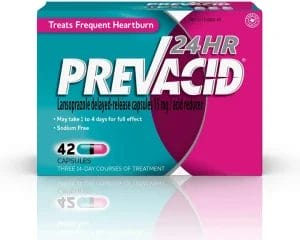
Symptoms of Heartburn
Knowing the symptoms of heartburn can help you determine if your discomfort is due to this condition or something more serious.
The primary symptom of heartburn is an intense burning sensation in the chest area, just behind the breastbone. This pain often spreads to the throat, neck, and jaw and may worsen when lying down or after eating certain foods.
Other signs include belching, coughing or hoarseness, and a sour taste in your mouth due to the regurgitation of stomach acids. In addition, some individuals may have difficulty swallowing or feel like food gets stuck in their throats when eating meals.
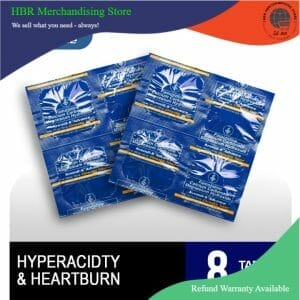
Medications: Treatment for Heartburn
Antacids are usually the first type of medication recommended for those with heartburn. They work by neutralizing acid in the stomach and providing quick relief from symptoms.
H2 blockers are another option; they reduce the amount of acid produced in the stomach over time to help prevent future episodes of heartburn. Proton pump inhibitors (PPIs) are sometimes prescribed if antacids or H2 blockers aren’t sufficient enough to manage ongoing symptoms.

Home Remedies and Treatments for Heartburn
Heartburn can be caused by eating certain foods, such as spicy or acidic dishes, and can be exacerbated by stress or physical activity. While many over-the-counter medications help reduce heartburn symptoms, natural remedies may provide additional relief. Home remedies for heartburn include drinking plenty of fluids like water, chamomile tea, or aloe vera juice; avoiding lying down after meals or eating large portions; elevating the head of the bed while sleeping; and consuming herbal teas like ginger tea and slippery elm tea.
Additionally, herbs like turmeric have anti-inflammatory properties, which may help reduce pain caused by heartburn. Yogurt also contains probiotics which can help prevent future heartburn flare-ups.

Diet Modifications: Treatments for Heartburn
Making dietary modifications can be an effective way to reduce or eliminate heartburn symptoms. Foods high in fat, such as fried foods, can increase stomach acid production and cause heartburn.
Additionally, spicy foods and acidic fruits such as tomatoes or oranges may trigger uncomfortable symptoms. Therefore, limiting or avoiding these types of food is important if you experience frequent heartburn. Instead, focus on nutrient-dense items such as lean proteins, whole grains, non-citrus fruits, and vegetables to ensure a well-balanced diet without causing discomfort.

Complications of Untreated Heartburn
Heartburn is a common symptom of acid reflux and GERD. Heartburn can cause complications such as Barrett’s esophagus and increased cancer risk when left untreated. It is important for Filipinos who experience frequent or severe heartburn to understand the potential risks associated with leaving it untreated.
Barrett’s esophagus is a condition where the normal tissue in the lower part of the esophagus changes due to chronic exposure to stomach acid. Having chronic heartburn can increase one’s risk of developing Barrett’s esophagus, which in turn increases the risk for certain types of cancer, such as adenocarcinoma.
Other potential complications include chest pain, asthma-like symptoms, difficulty swallowing, dental erosion, and damage to vocal cords from refluxed stomach acid.

Which Doctor Can Treat Heartburn?
Heartburn is a common complaint among many individuals, no matter what their age. It can range from mild to severe and, in some cases, can even be indicative of a more serious health condition. The good news is that there are treatments for heartburn available right here in the Philippines. But which doctor should you visit for successful treatment?
An internist or gastroenterologist is the most suitable health professional to diagnose and treat heartburn. An internist is a physician who specializes in diagnosing and treating diseases of the internal organs, such as the digestive system. A gastroenterologist, on the other hand, specializes in diagnosing and treating diseases related to the gastrointestinal (GI) tract – including heartburn – as well as preventive care related to GI tract disorders.
Final Thoughts: Effective Treatments for Heartburn
In conclusion, heartburn is a prevalent condition in the Philippines that can be treated through lifestyle modifications, medications, and natural remedies. The best treatment option for any individual depends on the severity of their symptoms and the underlying cause of their heartburn. As such, working with a healthcare professional to determine which treatment option is best for you is important. Remember that many effective treatments are available to help you find relief from your heartburn.
The treatments for heartburn in the Philippines are varied, ranging from lifestyle changes to medications. It is important to seek medical advice to find out what treatment plan is best suited for one’s individual case. Furthermore, there is a need to continue researching ways of preventing and treating heartburn to make sure that every Filipino has access to the necessary resources and knowledge to remain healthy.
Sources: Treatments for Heartburn
- Home Remedies for Heartburn: 9 Ways to Get Rid of Acid Reflux – Houston Methodist
- Heartburn Relief: Natural Remedies, Medication, Prevention – Healthline
- Heartburn Relief: Simples Steps to Soothe the Pain – WebMD
- Heartburn: What It Feels Like, Causes & Treatment – Cleveland Clinic
- 6 Natural Remedies For Heartburn – SelectHealth
- Over-The-Counter (OTC) Heartburn Treatment – FDA
- Home Remedies For Heartburn | Franciscan Health
- Heartburn: Causes, symptoms, and treatments – Medical News Today
- Heartburn and acid reflux – NHS
Disclaimer
This website is intended to educate both members of the general public and those working in the medical field on the prevalence, causes, and methods for preventing, diagnosing and treating diseases that affect people throughout their lives. This website’s content is provided solely for informational reasons and is not meant to serve as a substitute for the advice of a qualified medical practitioner.













